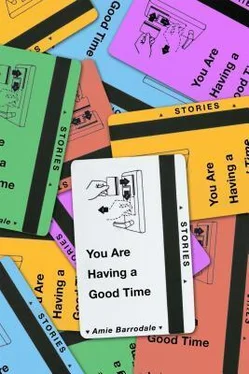She turned over an end table and lunged for his other Satsuma vase. This one she raised above her head with both arms and threw down onto the hardwood floor. One of the handles broke off.
Abruptly, unexpectedly, she got a hold of herself. She looked around. She said, “I’ve got to go.” Then her mouth turned down involuntarily twice. She opened the door to his office and said, “Let’s go.”
“Is something the matter?” a woman’s voice said.
“He said we can’t see each other anymore.”
“Whatever for?”
Dr. Sheppard recognized Kitty’s voice. She said, “Debbie, hon. Debbie? Where are you going?”
Kitty was in the waiting room of his office. It was 11 a.m. and spring, but she wore stiletto-heeled boots, skin-tight leather pants, a cropped band jacket, and a matching polka-dot necktie and blouse. His secretary eyed Kitty with fear and anticipation. She had watched Debbie storm out and was no doubt looking forward to a show.
“Dr. Sheppard,” Kitty said, “Debbie charged off…” She smoothed her hair. “Why are you holding that vase?”
He realized he had the undamaged vase in his arms. He sat down with his arms wrapped around it. Kitty sat down next to him.
Kitty said, “I’m a little confused.”
“So am I.”
She smoothed her hair a second time. “Ever since we spoke in France, you haven’t been answering my calls.”
“I’m sorry, Kitty. It’s been a very busy time. My school responsibilities have been onerous. I’m a bit overwhelmed.”
“Is this because of what happened between the two of us?”
Dr. Sheppard cringed. “I’m not sure what you’re referring to. I’d like to discuss Debbie with you, Kitty. But I’m afraid I can’t, as it would violate patient-doctor confidentiality. You understand that.”
“Patient-doctor what?”
“Confidentiality. My professional ethics.”
Kitty nodded. “Of course.”
She stood up to go. Then she paused. She turned.
She said, “There’s something I’ve always meant to ask you, Dr. Sheppard. Since we’re speaking as professionals.”
“Ask anything.” He shrugged, and put the vase on the coffee table.
“Why did your wife leave you?”
He started to explain to her about his professional success, and Isabel’s suggestion that he was arrogant. Before he could fully express his thoughts, Kitty said, “Isabel is a very beautiful woman. I think it’s much simpler than all that, Dr. Sheppard. Did you ever think it might have had something to do with your being fat?”
“I’m — I beg your pardon?”
The conversation wasn’t going well. It would be better to go back to his office. Kitty caught him as he rounded the coffee table. He kept his arms around the vase. She pushed him down onto the couch.
He tried to get back up, and Kitty grabbed his shoulders. He shoved her, and the vase fell to the ground, but it did not break. She punched him in the throat. He fell backward onto the couch. Kitty must have taken self-defense classes. He was having trouble breathing. She gathered her handbag from his desk, brushed her hair with one hand.
She turned on a heel and strode out. As she was opening the door, he said, “You cunts.”
She turned her head slightly, but caught herself. He read the expression on her face. She was fascinated.
After they made love he said, “Ema, I’ve been reading a new book. Well, it’s an old book, but no one knows about it anymore. It’s a great book, though writing it ruined the author’s career. She’s a fascinating woman — she was — Sloane Newam, do you know her?”
“I’ve heard the name,” Ema said. “I think I read something by her — she wrote that thing about a television show, didn’t she?”
“ Night Report on ABC. But the book is about a whole network!”
“That’s right. Night Report , that thing, bum-BUM-bum.”
“You would like this Sloane Newam. She’s funny. She reminds me of you.”
“What do you mean?”
* * *
At the airport the next day, he gave her a copy of Sloane Newam’s memoir and said, “Read it and you will see.”
She began reading in the line at check-in. Halfway through the novel, flying over Missouri, she came to a fight between Sloane Newam and the head of her network. Mid-sentence, Sloane Newam wrote, “This may be the wrong time to say that I loved him. I did.” Ema pressed the book to her chest.
“Are you all right?” the woman beside her asked.
Ema wiped her cheeks and nodded. She turned away from the woman. She’d drunk several small bottles of scotch. She didn’t want to be rude, so she turned back to face the woman and said, “It’s pretty, huh? Out the window. It’s Missouri. Get it? Mis-uh-ry? Misery. It’s like — I’m so happy, I’m over misery — Missouri. Ha.”
The woman seemed embarrassed and turned away.
* * *
Sloane Newam had written two novels. They were out of print. One was on sale on Amazon for a penny, plus shipping, and the other was priced at $109. Ema ordered both.
They came the day before Christmas. Ema made her champagne sorbet. It was made by pouring two bottles of champagne into a bowl and putting it into the freezer, then stirring every half hour. She ate her champagne sorbet from the bowl, in bed with a spoon, and read Sloane Newam’s novels.
The second was about Sloane Newam’s lifelong affair with a married man. Sloane Newam had captured what Ema could not. She had captured the way loving someone who wasn’t there made the world seem funny and enchanted.
Was the married man trying to tell her this? Ema didn’t think so. She didn’t think the married man had read the novels, and if he had, it was unlikely he would understand them. For him the affair was an escape valve. For her it was poetic. She had once tried to tell him, “You are in the fabric of everything I see. When I see three young men in denim jackets, I am already describing it to you. Before I describe it to myself, I am in a dialogue with you.” He hadn’t been able to make it out to L.A. for a few months after that.
But Sloane Newam expressed it, because she barely talked about her married man at all. Instead, she described scenes from her life. She described being stranded at an airport in France, in the ticketing area outside of the terminal, and having to spend the night sleeping on a long bench with a group of French hobos. One offered her apple wine, and told the others, “She is normal. She is normal. Nothing happens to her.” She told a story of a bat that flew into her bedroom and perched on the exposed-brick wall, and how she took him out by hand. Her novel was a defense of adultery, and a rejection of the commonsense stuff everyone spouted — that he had to get a divorce, that she had to leave him. Sloane Newam did neither. At the end of her novel she asked the married man, “Do you ever wish I was the one with you?” He said, “You are.”
Ema completed that novel at 3 a.m., and she wrote a long text message to the married man. When she clicked send, her phone’s screen went blank. She flipped from the main screen back to the message screen. It had lost her text!
Then the first two sentences of her text rolled up. They had gone through, she guessed, but the rest of the text was gone. Horrified, she reread the two lines. They were weird and alone-looking.
I have been up reading Fiber Optics, Holy Places. I just finished it. It has this beautiful passage where she describes a kitten — she is Joan
Ema was confused. Two more lines from her text rolled up.
Newam — on the streets of Varanasi. It is so incredibly amazing — she’s there on assignment, and she’s just been to prayers at the
Читать дальше












